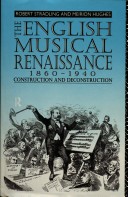Music and Society
2 total works
The English Musical Renaissance, 1840-1940
by Robert Stradling and Meirion Hughes
Published 9 August 2001
In this work Robert Stradling and Meirion Hughes argue that research into the cultural history of music can significantly help our understanding of the evolution of English national identity. The authors study the evolving life of music in this period for the mainsprings of its meaning, power and function, reviewing its history and finally deconstructing its established meanings. By the turn of the century music had come to represent the privileged elite. At the same time, it was seen as a stronghold of national values, struggling to escape alien influences - above all that of Germany - and reflecting the reassuring "Englishness" of middle-class life, its aesthetic qualities celebrated as national achievemnets and as criteria of a secure and civilized empire. This work isolates and identifies the intellectual, social and political assumptions which surrounded English music in the early part of the 20th century, and the relates the "renaissance" to its true cultural context.
What are the relations between "music" and "nation", and why are some composers celebrated while others remain neglected? Music as "high" culture has become a high-profile commodity and yet it still lays claims to a unique spiritual sanctity. In "The English Musical Renaissance", Rob Stradling and Meirion Hughes argue that research into the cultural history of music can significantly help our understanding of the evolution of English national identity. Controversial in both its interpretation and methodology, their book challenges the intellectual and social assumptions which surrounded English music in the early part of this century, and relates the "renaissance" to its true cultural and intellectual context.

